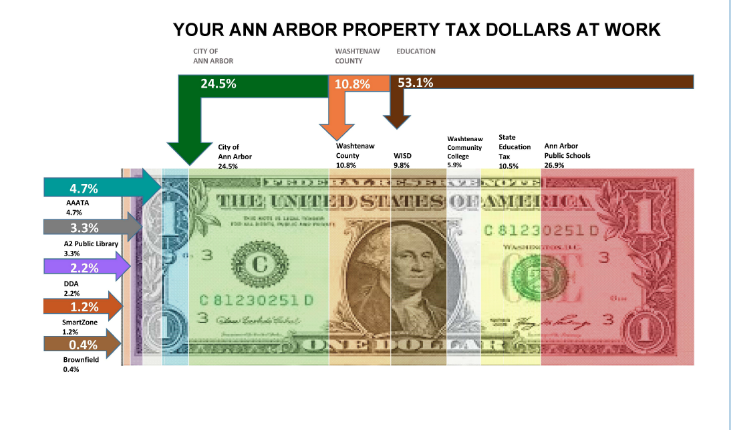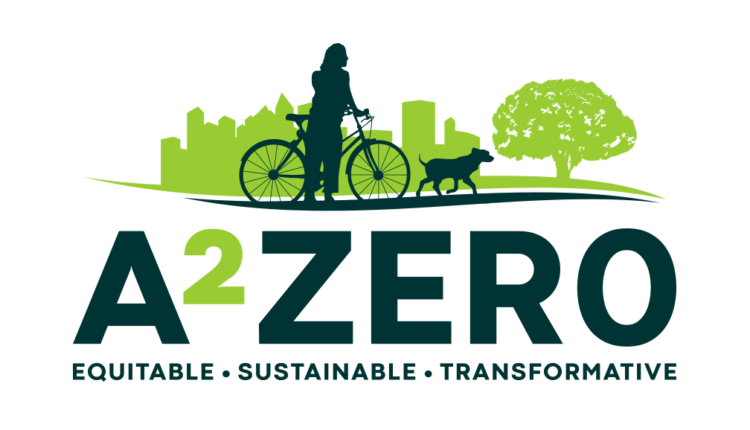City Council Members Vote to Require a Funding Plan for the $1 Billion A2 Zero Carbon Neutrality Plan
by P.D. Lesko
“There is no funding plan.” Ward 2 Council member Jane Lumm (I) repeated this phrase during the discussion on April 20 of a resolution co-sponsored by Mayor Taylor, Ward 3 Council members Grand and Ackerman, and Ward 5 Council member Smith, to adopt the proposed A2 Zero Carbon Neutrality Plan at a cost of $1 billion. Lumm, who has served on Council for 11 years, also pointed out that when Council is asked to implement programs that impact the City’s budget, funding plans are required. Lumm said she didn’t want to delay, but rather amend the resolution.
During the Monday April 20 City Council meeting, Lumm introduced the following amendments to replace the first three resolved clauses of the resolution sponsored by Grand, Ackerman, Smith and Mayor Taylor:
RESOLVED, that Ann Arbor City Council receives the A2 Zero Carbon Neutrality Plan and expresses its appreciation to City Staff for their efforts in providing a comprehensive, timely response to Council’s November 4, 2019 Resolution; and
RESOLVED, that City Council requests the City Administrator develop a funding plan by source and year and develop a framework or mechanism for Council to utilize in evaluating and prioritizing high-leverage actions; and
RESOLVED, that City Council requests the City Administrator present the A2 Zero Carbon Neutrality Plan to City Council for further consideration when the funding plan and prioritization framework have been developed.
During the discussion of Lumm’s proposed resolved clauses, Council member Ali Ramlawi (D-Ward 5) said that to adopt a plan with a billion dollar price tag without funding sources identified would be “fiscally irresponsible.” Ramlawi pointed out that, in past, the four co-sponsors have reminded other Council members who’ve proposed resolutions that called for the expenditure of taxpayer money that they needed to identify sources of funding.
Ramlawi also offered up his own amendment that passed. He replaced language in the resolution that Council would be apprised of plan progress “at least yearly,” with language that required quarterly reporting from the Office of Sustainability and Innovation.
During the discussion of Lumm’s proposed resolved clause amendments, Ward 1 Council member Jeff Hayner (D) referred to the A2 Zero Carbon Neutrality Plan adoption resolution as a “blank check.” On social media, Hayner extended his comment: “No Blank Check for Endless War on Climate Change.” Hayner also said that Ann Arbor’s efforts to become carbon neutral would have little impact on global climate change.
Ward 1 Council member Anne Bannister (D) expressed concern and disappointment that the A2 Zero Carbon Neutrality Plan does not include a plan to reduce or eliminate the City’s methane footprint (generated primarily from the landfilling of food waste). Methane is roughly 30 times more potent as a heat-trapping gas than carbon dioxide. Bannister crafted a plan for the City to partner with Food Gatherers to reduce that organization’s methane footprint. Bannister said city staff had asked her to hold off on bringing her resolution until the A2 Zero Carbon Neutrality Plan was completed.
In the end, City Council did not agree to adopt the billion dollar A2 Zero Carbon Neutrality Plan at their April 20, 2020 meeting. Council instead voted 11-0 to receive the plan. Interim City Administrator Tom Crawford said he considered the vote his cue to produce the requested funding plan and prioritization framework which, he said, “should not take that long.” Without Council approval of funding, the A2 Zero Carbon Neutrality Plan will be aspirational.
None of the five candidates supported by Mayor Taylor in their current runs for City Council commented during the April 20 Council meeting held via Zoom. In April candidate forums, however, Ward 1 candidate Lisa Disch, Ward 2 candidate Linh Song, Ward 3 candidate Travis Radina, Ward 4 candidate Jen Eyer and Ward 5 candidate Erica Briggs all said they supported the resolution to adopt the A2 Zero Carbon Neutrality Plan, as well as the particulars of the plan. None of those candidates commented that the resolution required a funding plan, and none pointed out the missing prioritization plan.
Diane Brainard is an Ann Arbor resident. She was supportive of the Council members’ efforts to practice “due diligence.” Brainard said, “Jane [Lumm], like other CMs, shows she practices careful and responsible management of tax dollars entrusted to CMs’ stewardship by people like me.”
Refusal to adopt the plan was grounded in criticisms and concerns that the Office of Sustainability’s plan, created by former City Administrator Howard Lazarus and the Director of the Office of Sustainability and Innovation, Dr. Missy Stults, required buy-in from the University of Michigan. While the University of Michigan President’s Commission on Carbon Neutrality is listed as an A2Zero consortium partner, officials at U-M have expressed little interest in Stults’s goal to reduce the University’s carbon footprint to zero.
Without cooperation from the University of Michigan, it will be impossible for Ann Arbor to reach the carbon zero goal outlined in Stult’s A2 Zero Carbon Neutrality Plan.
It has been estimated that U-M produces roughly one-third of the City’s total carbon emissions. University officials are working on their own sustainability initiatives. U-M’s sustainability goal is to reduce its own carbon footprint by 25 percent by 2025. However, that goal falls well short of the zero carbon emissions goal set forth in the Office of Sustainability’s plan. In addition, the A2Zero plan requires the expenditure of hundreds of millions of dollars up front before any appreciable carbon reductions are realized in 2026. The plan also suggests that Ann Arbor residents could be asked—at their own expense—to replace all their appliances, including their furnaces, with ones that are acceptably energy efficient. Residents who did not do so could be blocked from selling their homes, according to the A2Zero plan.
Council member Jack Eaton said, “I am also concerned that total community carbon emissions do not substantially decline until 2026, and those reductions are predicted on the actions of other entities.” Eaton also said, “The plan that Council received, rather than adopted, needs significant work.”
On her campaign website, Jen Eyer, Eaton’s 2020 August 4 primary opponent writes, “I fully support the mission of our Office of Sustainability. It’s going to take a strong commitment by city leaders in order for Ann Arbor to reach its goal of 100 percent carbon-neutrality by 2030.”
During the April 20 meeting, tn turn, Grand, Ackerman, Smith and Taylor all asserted that the creation of a funding plan by source for each section of the A2Zero Carbon Neutrality Plan was not necessary. All argued that identifying funding would hold up the implementation. Grand, at one point, said that Lumm’s proposed amendments seemed little more than an effort to throw a “wrench” into the works.
Ward 5 Council member Ali Ramlawi (D) in obvious frustration, commented that when other Council members brought forward resolutions, the expectation was that funding sources would be identified. Ramlawi said he was not prepared to simply adopt a plan which could thrust the City of Ann Arbor into “bankruptcy.” Interim City Administrator Tom Crawford was asked to comment and countered that city staff would never bring forward plans that would endanger the city’s finances.
Crawford, in his budget presentation to City Council on April 20, projected a deficit of as much as $10.9 million. Crawford’s proposed budget includes the hiring of a dozen new city staff, identifies few budget cuts and focuses on increased spending. The Interim City Administrator’s budget does not put a moratorium on travel, conferences or the use of consultants. Crawford’s budget assumes a rise in property taxes and imposes a 7.5 percent hike in water and sewer rates.
In comparison, on April 20, the University of Michigan announced that in response to a looming budget deficit it would freeze hiring and salaries. In an email to all faculty and staff, U-M president Dr. Mark Schlissel said that, “all three campuses — including Michigan Medicine — estimate anticipated losses of $400 million to $1 billion through the end of the 2020 calendar year.” Schlissel announced the elimination of non-essential expenditures, which includes travel, conferences and use of consultants.
While the total mills assessed by the City have decreased, thanks to rising property assessments by the City, additional city millages, a $1 billion AAPS bond proposal and a perpetual AAATA millage, Ann Arbor owner-occupied residential tax bills between 2009 and 2020 have doubled.
In response to a recent A2Independent Facebook poll, almost three-quarters of respondents said the City should offer abatements on residents’ summer 2020 tax bills. This image from the City’s website shows the allocation of a tax dollar in Ann Arbor:


